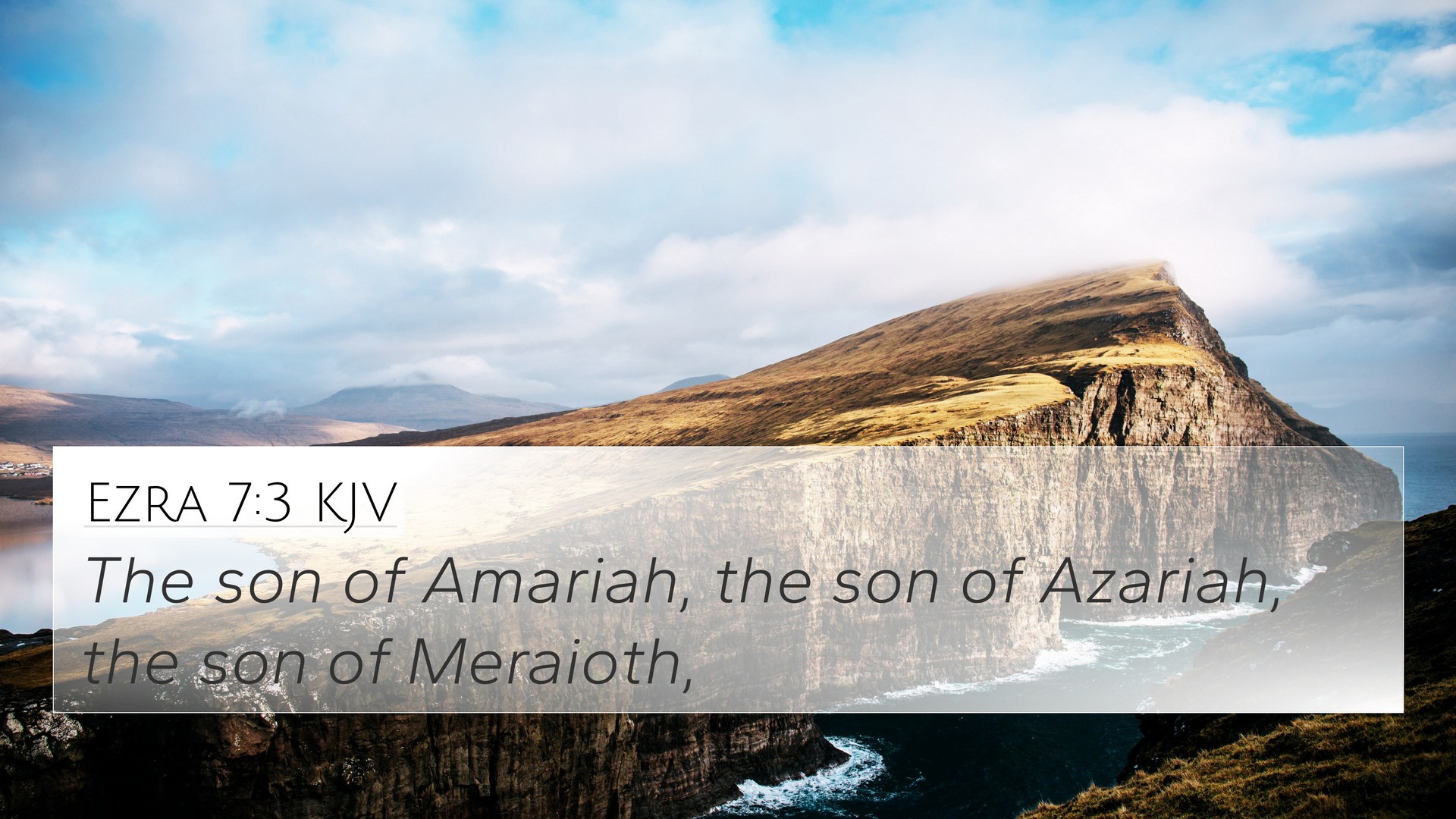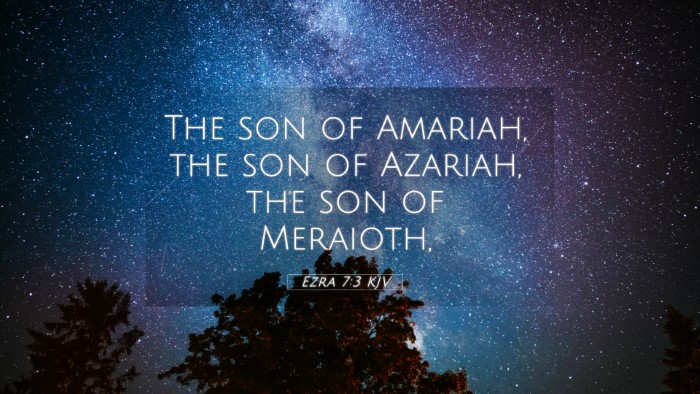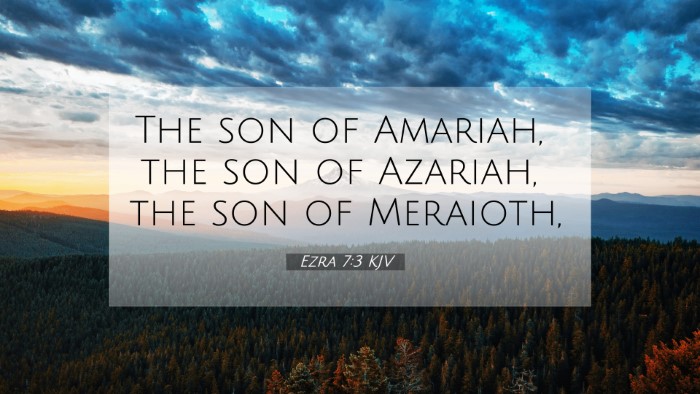Old Testament
Genesis Exodus Leviticus Numbers Deuteronomy Joshua Judges Ruth 1 Samuel 2 Samuel 1 Kings 2 Kings 1 Chronicles 2 Chronicles Ezra Nehemiah Esther Job Psalms Proverbs Ecclesiastes Song of Solomon Isaiah Jeremiah Lamentations Ezekiel Daniel Hosea Joel Amos Obadiah Jonah Micah Nahum Habakkuk Zephaniah Haggai Zechariah MalachiEzra 7:3 Similar Verses
Ezra 7:3 Cross References
The son of Amariah, the son of Azariah, the son of Meraioth,
Uncover the Rich Themes and Topics of This Bible Verse
Listed below are the Bible themes associated with Ezra 7:3. We invite you to explore each theme to gain deeper insights into the Scriptures.
Ezra 7:3 Cross Reference Verses
No cross reference images were found in our system for this Bible passage.
Ezra 7:3 Verse Analysis and Similar Verses
Understanding Ezra 7:3
Ezra 7:3 states: "The son of Abishua, the son of Ahitub, the son of Phinehas, the son of Eli, the son of Aaron the chief priest."
This verse provides essential genealogy, linking Ezra to the priesthood through a series of ancestors. It emphasizes Ezra's rightful position as a priest and teacher, thus establishing his authority in the restoration of the Jewish community after the Babylonian exile.
Significance of Ezra's Lineage
The genealogy recorded in this verse serves multiple purposes:
- Covenantal Continuity: Ezra is connected to Aaron, the first high priest, indicating a continuation of the priestly lineage mandated by God.
- Authority and Legitimacy: By identifying himself as a descendant of Aaron, Ezra's authority to lead and teach is firmly established.
- Fulfillment of God's Plan: The preservation of the priestly line throughout Israel's history underscores God's faithfulness to His covenant people.
Commentary Insights
Matthew Henry's Commentary
Matthew Henry notes that Ezra's genealogy not only reinforces his judicial and spiritual authority but also reflects the importance of maintaining a pure priestly line for service in the temple. The emphasis on lineage corresponds with Old Testament principles regarding priestly qualifications.
Albert Barnes' Commentary
Albert Barnes emphasizes that genealogy in Israel wasn't merely about lineage; it was a testament to God's covenant with the Israelite people. This connection to Aaron was pivotal, signifying Ezra’s ability to represent the people before God.
Adam Clarke's Commentary
Adam Clarke highlights how each name in the lineage connects to significant Biblical events. The mention of Phinehas, known for his zeal for God, establishes a precedent for Ezra’s future actions in returning to Jerusalem to restore religious practices.
Bible Verse Connections
Ezra 7:3 can be cross-referenced with various scriptures that offer additional context and thematic ties, enhancing our understanding of Ezra’s role and the significance of the priesthood throughout the Bible. Here are some important connections:
- Exodus 28:1: Highlights the establishment of the priesthood and the holy office that Ezra is part of.
- Numbers 25:10-13: Relates to Phinehas’s actions and his legacy, which is crucial for understanding Ezra’s character.
- Malachi 2:4-7: Refers to the priest’s role in preserving knowledge and teaching God’s laws, which is pertinent to Ezra’s mission.
- Hebrews 7:11: Discusses the priesthood and its transformative nature which echoes through initially Old Testament standards to New Testament fulfillment.
- 1 Chronicles 6:4-15: Further illuminates the lineage of the high priests, confirming Ezra’s position.
- Ezra 7:10: Illustrates Ezra’s dedication to study and practice of God’s law, aligning with the expectations of descendants of Aaron.
- Luke 1:5: Connects to the priestly lines prominent during New Testament times, providing a fuller narrative of God’s plan through priesthood.
- Hebrews 5:1-4: These verses establish the qualifications for a priest, underlining the importance of Ezra’s lineage.
- Jeremiah 33:18: Prophetic insights into the continuity of the priesthood, affirming God’s promises which include Ezra's activities.
Tools for Bible Cross-Referencing
To gain a deeper understanding and find connections between Bible verses, several tools and methods are beneficial:
- Bible Concordance: A helpful reference tool for locating specific words and phrases in scripture.
- Bible Cross-Reference Guide: Provides an organized way to explore thematic connections.
- Cross-Reference Bible Study: Engaging in cross-referencing can deepen one's understanding of complex themes.
- Bible Chain References: A method for connecting scripture passages in a chain-like format, allowing for thematic exploration.
- Comprehensive Bible Cross-Reference Materials: These resources compile connections that can aid in theological studies and sermon preparation.
Conclusion
The brief genealogy found in Ezra 7:3 serves as a foundational piece illustrating the importance of lineage in establishing authority, continuity of the priesthood, and God's ongoing relationship with His covenant people. Through the lens of various commentaries, the verse is enriched with meaning that encourages deeper thematic exploration and inter-textual dialogue within the Bible. By leveraging cross-referencing tools and methods, readers can uncover profound connections between biblical texts, ultimately enhancing their understanding of scripture and the overarching narrative of God's plan for humanity.


